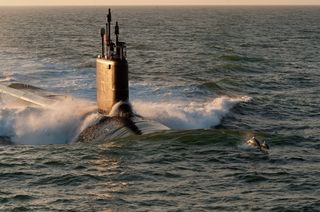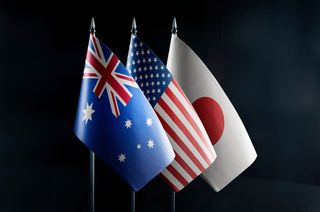ABC The Drum
Barack Obama's failure to put the rise of Islamic State in the context of the broader Sunni-Shia dispute was a crucial, and revealing, oversight in his address, writes Tom Switzer.
For the third time in as many decades, the United States is leading a coalition of allies into Iraq. But unlike George HW Bush's liberation of Kuwait in 1991 — and like George W Bush's liberation of Iraq in 2003 — Barack Obama's war by any other name in 2014 is bound to fail.
In principle, any sane person supports the President’s campaign to "degrade and destroy" the jihadists in Iraq and Syria, most notably the so-called Islamic State. Most of us, as Vice-President Joe Biden has urged, would like to follow these barbarians "to the gates of hell until they are brought to justice".
But if one wants to be effective and not merely to feel virtuous, the process of eradicating what is essentially a disparate group of Sunni militants is complicated, potentially messy and fraught with the danger of unintended consequences. All the more so when we are dealing with an arbitrarily created state and ethnically and tribally divided society.
Few things are better calibrated to end insomnia than ruminations on the Sunni–Shia divide in Mesopotamia; and perhaps that is why the President neglected the subject in his address this morning (AEST). True, he had enough on his agenda, including his attempt to explain how a broad-based campaign of allies (that is nowhere near as wide-ranging as President Bush Sr's coalition in 1991) would use primarily air power to defeat the Islamist terrorists.
But the failure to put the rise of IS in the context of the broader Sunni-Shia dispute was a crucial, and revealing, oversight on the White House's part.
For the taproot of the debacle unfolding across Iraq — the resurgence of Islamist terrorism, the takeover of many Sunni towns in northwest Iraq, the bitterly divided central government in Baghdad — is the Sunni-Shia divide. And it was these sectarian tensions which the US–British–Australian invasion exacerbated in 2003.
For generations, first under the Ottomans, then under the British, Hashemites and Baathists, the Sunnis were the top dogs in Baghdad. Since the demise of Saddam Hussein, the majority Shia have been the winners; and they have been more interested in seeking revenge against their former tormenters than in building a nation.
If the Sunnis continue to feel their loss in the post-Saddam era remains absolute, and the US-led military campaign confirms their fears that Washington is in cahoots with the Shia-led government, they will remain defiant and oppose any efforts to reconcile with Baghdad.
Unfashionable though it is to say, the reason for IS's relatively easy takeover of Sunni towns, such as Mosul and Fallujah, in recent months, has less to do with their wicked ways and more to do with the fact that the broad cross-section of Sunnis in these areas are more scared about Shia-led government in Baghdad and its persistent attempts to get square for decades of mistreatment.
Since 2003, and especially since Nouri al-Maliki came to power in 2006, Sunnis insist the Shia-led government in Iraq has marginalised and discriminated against Iraq's minority Muslim sect.
That is why the new US-led air strike campaign — which perversely both Syria's Assad and Iran's Mullahs support — is likely to reinforce the potent Sunni narrative that the US is favouring the Shia. That could boost support for the Sunni militants in the Sunni heartland. Over time, it might test the resolve of America's long-standing Sunni allies in the region, such as Saudi Arabia and Qatar, to fight the very Sunni jihadists they had until recently been giving tacit support.
In other words, instead of draining the jihadist swamp, the new US-led military campaign could replenish it.
In his remarks today, the President failed to explain how the US-led campaign should placate the disenfranchised Sunnis while targeting Sunni extremists. He is hardly alone. Neither David Cameron nor Tony Abbott has caught the significance of the Sunni–Shia divide.
That is why the mission is bound to fail ultimately.
This article was originally published at ABC The Drum




